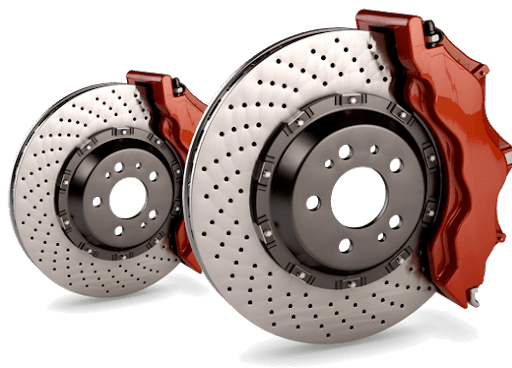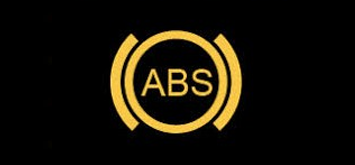
Brake Service
From simple brake fluid changes in accordance with vehicle service schedule’s up to full Brake inspections including Pads, Discs, all Hydraulic parts, hoses and pipes. Electronic handbrake systems catered for as well as all other aspects of brake work undertaken, including ABS system diagnostics and repair.

Because of the way a braking system works, by using a pad to grip a metal disc – there are several components that can wear out over time. As a result, brake repair and replacement of parts such as brake pads, brake discs and brake fluid will be required from time to time.
Many vehicle owners make the mistake of waiting until they detect some sign of deterioration or ineffectiveness. We therefore recommend having your vehicle regularly serviced and by having periodic brake checks to assess the condition of the braking system and check whether replacement parts are required before any problems occur.
It is impossible to say exactly how often a repair or replacement is required, not least because different vehicles are used in different ways. For example, stop-start town driving is typically more demanding on your brakes than consistent driving, for example on motorways.
What does a brake check cover?
During a brake check, our technicians will carefully inspect all wearable parts including brake pads, brake discs and brake fluid. To check the brake pads and discs, specialist equipment is used to take accurate measurements of these components. If the measurements do not meet with those specified for the vehicle by the manufacturer, the parts will need to be replaced.
The brake fluid will also be checked to determine whether it needs replacement due to ageing or contamination. As a general guide, brake fluid will need replacing at least every two to three years. All brake pipes and flexible hoses along with all connecting points are carefully inspected for deterioration or corrosion.
Following a brake check, you will be provided with a detailed report on the condition of your brakes together with a quotation for any work that might be required.
All brake replacement parts and materials used are of high quality and in keeping with the manufacturer’s requirements.
What does a brake check cover?
During a brake check, our technicians will carefully inspect all wearable parts including brake pads, brake discs and brake fluid. To check the brake pads and discs, specialist equipment is used to take accurate measurements of these components. If the measurements do not meet with those specified for the vehicle by the manufacturer, the parts will need to be replaced.
The brake fluid will also be checked to determine whether it needs replacement due to ageing or contamination. As a general guide, brake fluid will need replacing at least every two to three years.All brake pipes and flexible hoses along with all connecting points are carefully inspected for deterioration or corrosion.
Following a brake check, you will be provided with a detailed report on the condition of your brakes together with a quotation for any work that might be required.
All brake replacement parts and materials used are of high quality and in keeping with the manufacturer’s requirements.
Signs that there could be an issue with your braking system

- A feeling of softness under your foot or brakes that do not seem to be responding to the pressure you apply. This can be a sign that the condition and effectiveness of your brake fluid should be checked.
- A grinding could be a sign your brake pads are heavily worn and need to be replaced.
- A squealing noise from your brakes often indicates that there is a possibility that the brake pads are either worn, stuck or a brake caliper would be sticking or seized. This would need to be investigated further.
- A juddering sensation when you apply the brake or a tendency for the vehicle to veer to one side during braking.
- A high handbrake or too much movement in your handbrake lever (parking brake).
If any of these symptoms appear or if you are unsure about the condition of your brakes, it is generally advisable that you stop using your vehicle and have your brakes checked as soon as possible as a safety concern or to avoid further damage.
Book Your BRAKE SERVICE With Us Today!
We are now taking bookings for MOT tests. Fill out the form below, and we will get back to you as soon as we can, alternatively
feel free to give our workshop a call on 01795 515556
What are anti-lock brakes and how do they work?

Anti-lock brake systems (ABS) are designed to prevent your vehicle’s wheels from locking (and skidding) during emergency stops and other challenging conditions.
How does ABS work?
Using electronic sensors and high-pressure pumps, under certain conditions, your ABS system can measure your vehicle’s speed, wheel slip and the force you apply to the brakes. When the sensors detect a skid hazard, your ABS pumps the brakes for you with more speed and precision than a human driver can achieve.
How to anti-lock brakes help you?
ABS help’s you keep control of your vehicle when you stop suddenly or brake on slick surfaces. By preventing the wheels from locking, you maintain traction and steering as you stop, instead of skid. On some vehicles, anti-lock brakes may also decrease the braking distance required to stop safely, but this is not their main purpose.
Why does my brake pedal pulsate sometimes?
If your brake pedal pulsates during sudden stops or on slippery roads, that is probably your ABS in action, pumping the brakes. Keep your foot on the brake until your vehicle stops.
Several brake problems can cause brake pedal movement. Whenever your vehicle feels different without a clear explanation, its advisable to have it checked at the earliest opportunity.
What should I do when my ABS Light comes on?
What to do when your ABS light turns on depends on when the light turns on:
ABS light flashes at start-up (then turns off):
Your ABS system has just performed (and passed) its routine self-test. Nothing to worry about.
ABS light comes on at start-up (and stays on):
Your ABS self-test has found an issue. Your brakes will still work, but their anti-lock function will not engage. Drive mindfully of this missing safety feature until you have your ABS system checked.
ABS light comes on while you are driving:
Your ABS system has stopped working. Sometimes the issue is temporary but request an appointment if the light stays on after your next start-up.
ABS and brake lights come on:
On many vehicles, this means your brake system has a problem. Your vehicle is possibly not safe to drive. Get off the road at the first safe opportunity and have the vehicle checked as soon as.
Is it safe to drive with the ABS light on?
Driving with the ABS light on is safe if your brakes are working normally, but it’s less safe than driving with a functioning anti-lock-brake system. In situations where ABS would normally engage, you are at heightened risk of brake lock and skidding if that ABS light is on. It is a good idea to have your ABS system checked out at your earliest convenience.
Is it safe to drive with the ABS light and brake light on?
It is unsafe to drive most vehicles with the ABS and brake light on simultaneously. On most vehicles, the brake light alerts you to problems such as low brake fluid or low brake pads. On some older vehicles, the brake light will kick in along with the ABS light to alert you to an ABS system problem. Unless your vehicle is one of these, it is a good idea to err on the side of safety, consider your brakes unreliable, and have the vehicle inspected as soon as possible.
Newington
Sittingbourne
Kent
ME9 7PE